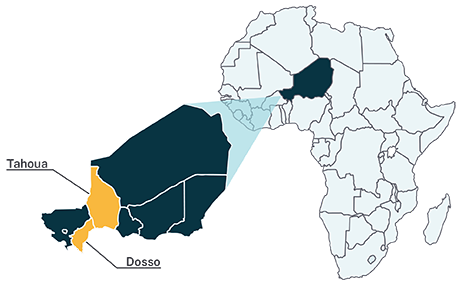Strengthening Malaria Prevention for Pregnant Women in Niger
November 6, 2025

MCD and project partners work in Niger's Dosso and Tahoua regions.
Malaria is a leading cause of medical consultations in Niger. Pregnant women and children under 5 are the most vulnerable, with children under 5 accounting for nearly 60% of cases between 2010 and 2019.
For pregnant women, malaria can cause maternal anemia, low birth weight, and increased risks of death for both the mother and baby.
To address this, Niger’s national malaria strategy aims to build equitable access to high-quality antenatal care through the five-year U.S. President’s Malaria Initiative (PMI) Advancing Health and Malaria Services (AHMS), led by Palladium, with support from MCD Global Health and other consortium partners.
To respond to the strong need of strengthening health care providers’ capacities to prevent and manage malaria in pregnant women, the PMI AHMS team trained 183 midwives and gynecologists in Niger’s Dosso and Tahoua regions in August 2024. The training was conducted along with Niger’s National Malaria Control Program (NMCP) and focused on improving the quality of care and increasing the coverage of intermittent preventive treatment during pregnancy (IPTp).
What is IPTp?
Intermittent preventive treatment in pregnancy (IPTp) is a strategy to prevent malaria in pregnant women by giving them antimalarial medication at regular intervals during pregnancy, typically starting in the second trimester.
Malaria during pregnancy can lead to serious complications for both the mother and the child, including low birth weight, premature birth, and increased maternal mortality. The WHO recommends that pregnant women in malaria-endemic areas receive at least three doses of IPTp, or IPTp3, during pregnancy.
The training exceeded expectations by reaching nearly 40% more providers than the original goal. Attendees showed great enthusiasm and recognized the value of improving health care workers’ skills in malaria prevention and management. The training included updates on World Health Organization (WHO) guidelines and practical skills, such as proper malaria testing and medication administration.
Abdou Hima, a malaria coordinator in the Tahoua region, said, “Given the low national coverage rate of IPTp3, particularly in the Tahoua region, this training was delivered at a critical time. As trainers and supervisors, we identified gaps in the mastery of biological diagnostic techniques and adherence to the malaria management protocol.
This intervention addressed several challenges, including the misconception that all malaria cases in pregnant women are classified as severe malaria, and weak adherence to treatment protocols based on gestational age, including the introduction of the first-line treatment for malaria, artemisinin-based combination therapies, in the first trimester.”
Now, health workers in Niger are better equipped to care for pregnant women, and health facility managers expressed confidence that IPTp3 coverage will align more closely with the WHO recommended levels.
By strengthening health care workers’ knowledge, skills, and capacity, pregnant women across Niger’s Dosso and Tahoua regions will receive higher quality malaria health services.
This story originally appeared in MCD's 2024 Annual Report.